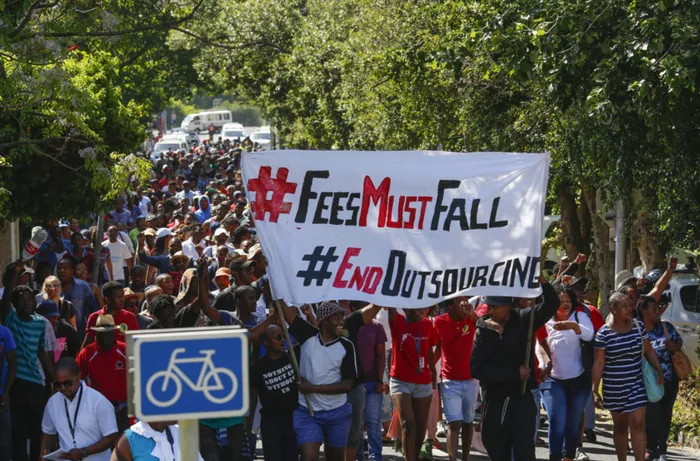
Students from the University of Cape Town protest against proposed fee increases in Rondebosch, Cape Town, on October 20, 2015. Picture: Nic Bothma Students from the University of Cape Town protest against proposed fee increases in Rondebosch, Cape Town, on October 20, 2015. Picture: Nic Bothma
Durban - The “turmoil and turbulence” in South Africa’s tertiary institutions was due to the lack of transformation in the economy.
This was the upshot of a talk by businessman Sandile Zungu at a business breakfast hosted by the University of KwaZulu-Natal to discuss transformation in the accounting profession.
Zungu, who is from KwaZulu-Natal, said the country faced a difficult situation, as students were up in arms demanding that fees be dropped to improve access to institutions of higher learning.
“The issue of access is a critical one. We need to open access; there is nothing wrong with that – it is not going to lower standards. There are limiting factors, but let’s embrace the ethos of open access that says not only those who are special must succeed. Not only those with access to resources must succeed.”
Zungu questioned how a child with working-class parents who earned R50 000 a year could enter university without financial support.
“It is not about entitlement, it is reality.
“There is an accommodation fee, tuition fees and other activities that students need to participate in. It is very expensive.”
UKZN’S deputy vice-chancellor and the head of the college of law and management studies, Professor John Mubangizi, said transformation in the accounting profession was “painfully slow”.
He said that statistics from the South African Institute of Chartered Accountants showed that of the 37 000 chartered accountants in the country, only 21% were black.
Of the 21% of black CAs, 65% were African.
Zungu also said that racism in business was still rife and a “huge psychological block” to transformation.
“There are those in industry who are not interested in transformation. We need to deal with the issue of racism which is pervasive and subliminal.”
Vanuja Maharaj, business executive at the auditor-general’s office in KZN, said there were several challenges for young people who wanted to succeed in the accounting profession, including access to undergraduate funding and not having adequate matric results.
Maharaj added there was also an “expectation gap” between the skills graduates had and what employers expected.
Institute chief executive and former auditor-general Terence Nombembe said it was important that students had role models in the academic environment.
“The influx of black academics in institutions is very important. So students can say, ‘If she or he could do it, why can’t I?’”
Nombembe said currently in the country, only 40% of Africans and Coloured students passed the postgraduate Certificate in the Theory of Accounting exams and the institute aimed at having that number rise to 60% in 2020.
“The 40% has been possible because of a lot of effort, but we are determined to increase it.”
THE MERCURY